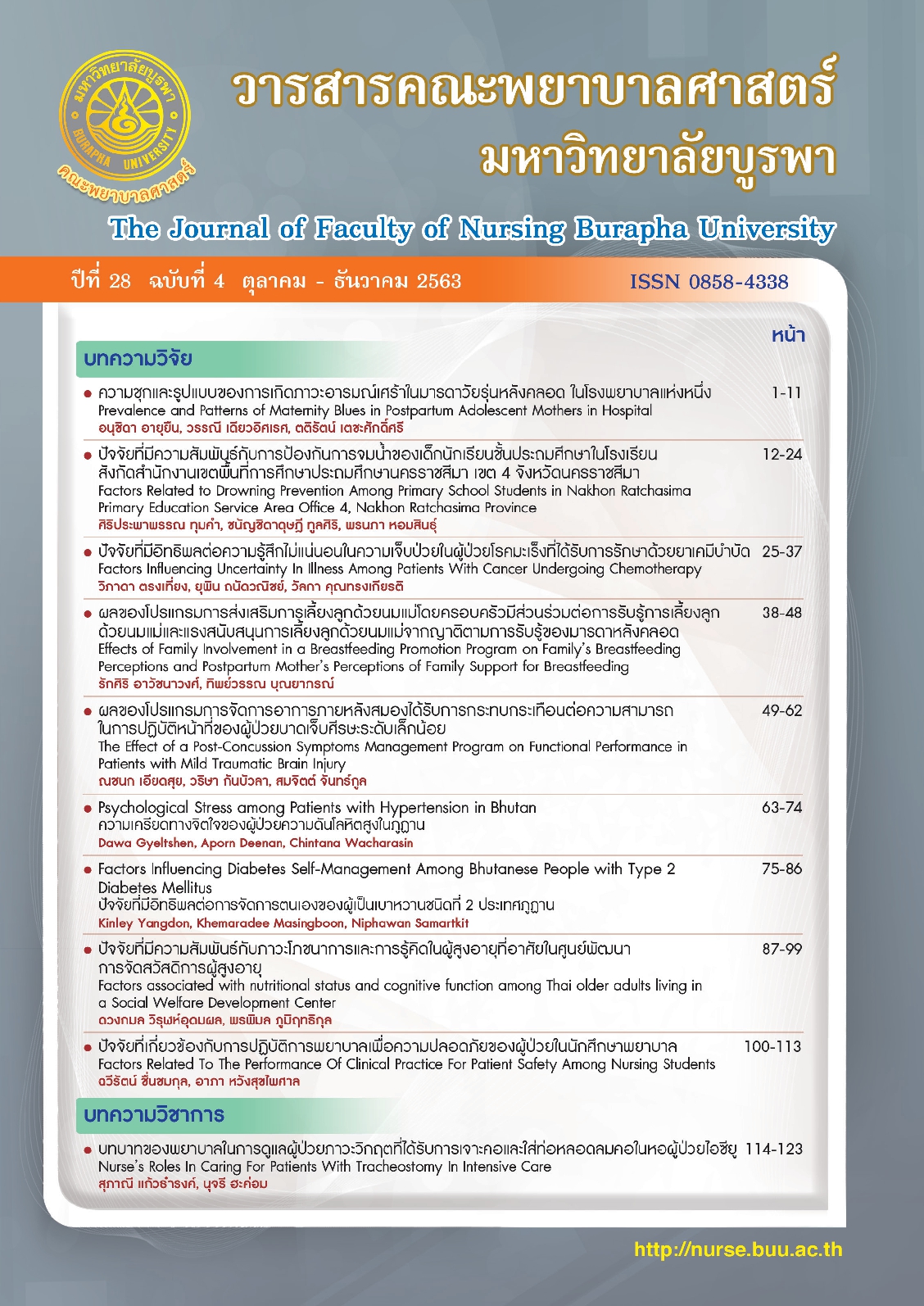ปัจจัยที่มีอิทธิพลต่อความรู้สึกไม่แน่นอนในความเจ็บป่วยในผู้ป่วยโรคมะเร็งที่ได้รับการรักษาด้วยยาเคมีบำบัด
คำสำคัญ:
ภาวะซึมเศร้า, การรับรู้ความรุนแรงของการเจ็บป่วย, การสนับสนุนทางสังคม, ความรู้สึกไม่แน่นอน, ผู้ป่วยมะเร็งบทคัดย่อ
การวิจัยนี้มีวัตถุประสงค์ เพื่อศึกษาปัจจัยที่มีอิทธิพลต่อความรู้สึกไม่แน่นอนในความเจ็บป่วย ในผู้ป่วยโรคมะเร็งที่ได้รับการรักษาด้วยยาเคมีบำบัด กลุ่มตัวอย่างเป็นผู้ป่วยโรคมะเร็งที่อยู่ระหว่างได้รับการรักษาด้วยยาเคมีบำบัด และมาพบแพทย์เพื่อรับยาเคมีบำบัดตามนัดที่หอผู้ป่วยเคมีบำบัด โรงพยาบาลราชบุรี ได้มาด้วยการสุ่มตัวอย่างแบบง่าย จำนวน 85 ราย เครื่องมือที่ใช้ในการวิจัยประกอบด้วย แบบวัดความรุนแรงของความเจ็บป่วยตามการรับรู้ของผู้ป่วย แบบประเมินความหวังของเฮิร์ท แบบสอบถามการสนับสนุนทางสังคม แบบสอบถามความรู้สึกไม่แน่นอนในความเจ็บป่วยของมิเชล และแบบประเมินภาวะซึมเศร้า วิเคราะห์ข้อมูลด้วยสถิติถดถอยพหุคูณ
ผลการวิจัยพบว่า ภาวะซึมเศร้า การรับรู้ความรุนแรงของความเจ็บป่วย และการสนับสนุนทางสังคม สามารถร่วมกันทำนายความรู้สึกไม่แน่นอนในความเจ็บป่วยในผู้ป่วยโรคมะเร็งที่ได้รับการรักษาด้วยยาเคมีบำบัดได้ร้อยละ 18.6 อย่างมีนัยสำคัญทางสถิติที่ระดับ.05 จากผลการศึกษาครั้งนี้เสนอแนะว่า พยาบาลควรพัฒนาการพยาบาลที่ช่วยลดการจัดการความรุนแรงของความเจ็บป่วย จัดการกับภาวะซึมเศร้า และความรู้สึกไม่แน่นอนในความเจ็บป่วยของผู้ป่วย ในขณะเดียวกันพยาบาลควรต้องส่งเสริมให้ผู้ป่วยมีการสนับสนุนทางสังคมที่ดีให้เพียงพอต่อความต้องการของผู้ป่วยและครอบครัวเพื่อลดความรู้สึกไม่แน่นอนในความเจ็บป่วยในผู้ป่วยโรคมะเร็งที่ได้รับการรักษาด้วยยาเคมีบำบัด
เอกสารอ้างอิง
http://www.cancer.org/acs/group/content/@epidemiologysurveilance/documents/ document/acspc-032009.pdf
Chaiviboontham, S., Viwatwongkasem, C., Hanucharurnkul, S., & McCorkle, R. (2011). Symptom
clusters in Thais with advance cancer. Pacific Rim International Journal of Nursing
Research, 15(4), 265-77. [In Thai]
Chung, C. (2005). Functional status and psychological adjustment in gynecologic cancer
patients receiving chemotherapy. Korean Journal Women Health Nursing, 11(1), 58-
66.
Choengthawi, P. (2017). Factors related to depression in colorectal cancer patients and anus
receiving chemotherapy: a case study of the oncology unit, Ramathibodi Hospital.
Srinakarin Vejsarn, 32(1), 63-70. [In Thai]
Detprapon, M., Sirapo-ngam, Y., Mishel, M.H., Sitthimongkol, Y., & Vorapongsathorn, T. (2009).
Testing of uncertainty in illness theory to predict quality of life among Thais with head
and neck cancer. Thai Journal Nursing Research, 13(1), 1-15.
Dufault, K., & Marttocchio, B. C. (1985). Hope: Its spheres and dimension. Nursing Clinics of
North America, 20(2), 379-391.
Faul, F., Erdfelder, E., Lang A., & Buchner, A. (2007). G*Power 3: A flexible statistical power analysis
program for the social, behavioral, and biomedical sciences. Behavior Research
Methods, 39(2), 175-91.
Gaskin, C. G.,& Happell, (2013), B. Power of mental health nursing research: A statistical analysis of
studies in the International Journal of Mental Health Nursing. International Journal of
Mental Health Nursing, 22(1), 69-75.
Herth, K. A. (1990). Fostering hope in terminally-ill people. Journal of Advanced
Nursing, 15(11), 1250-1259.
House, J. S. (1981). Work stress and social support. California: Addison Wesley Publishing
Company.
Jarassaeng, N, Mongkonthawornchai, S, Buntakheaw, P, Hanlakhon, P, Somlug, B, & Arunponpaisal
S. (2012). Depression in patients with chronic Illnesses. Journal of the Psychiatric
Association of Thailand, 57(4), 439-446. [In Thai]
Jo, K. H. (2017). The relationship of uncertainty, hope and quality of life in patients with breast
cancer. Journal Korean Academic Nursing, 34(7), 1184-1193.
Keiko, K. (2013). Uncertainty and psychological adjustment in patients with lung cancer.
Psychology, 22(6), 1396-1401.
Kim, H. (2013). Anxiety, depression and uncertainty in cancer patients participating in clinical trial
of anticancer drugs. Korean Journal Adult Nursing, 25(1), 53-61.
Koteprom, J, Pongthavornkamol, K, Chareonkitkarn, V, & Soparattanapaisarn, N. (2013). Factors
Influencing Perceived Cognitive Functioning in Breast Cancer Patients Receiving
Adjuvant Chemotherapy. Journal of Nursing Science, 31(2), 17-26.
Lamdubwong, A. (2001). Relationship between the characteristics of information received and uncertainty in the illness of colorectal cancer patients undergoing surgery in the
hospital. Master of Nursing Thesis. Adult Nursing Program Graduate School Mahidol University. [In Thai]
Maipimai, M., Payakkaraung, S., & Nookong, A. (2016). Mediating effects of uncertainty in illness on
relatinships between perception of child’s illness severity, education, social support,
and parental anxiety of children admitted to pediatric intensive care unit. Journal of
Nursing Science Chulalongkorn University, 28(3), 84-96. [In Thai]
Marry, E. (2012). Prevalence and correlates of symptoms and uncertainty in illness among head
and neck cancer patients receiving definitive radiation with or without chemotherapy.
Support Care Cancer, 20(2), 1885-1893.
Miller, L. E. (2014). Uncertainty Management and Information Seeking in Cancer Survivorship.
Journal Health Communication, 29(3), 233-243.
Mishel, M. H. (1988). Finding meaning: Antecedents of the uncertainty in illness. Nursing
Research, 37(2), 98-103.
Mishel, M. H., & Clayton, M. F. (2003). Theories of uncertainty in illness middle range theory for
nursing. New York: Spinger.
National Cancer Institute.(2018). Report of hospital cancer registration. Bangkok: Thai Press
Dance.
Nilchaikovit, T, Lortrakul, M, Phisansuthideth, U.(1996). Development of Thai version of
Hospital Anxiety and Depression Scale in cancer patients. The Journal of The Psychiatric Association of Thailand, 41(1), 18-30. [In Thai]
Noipiang, T. (2002) . Percieved Seveirity of Illness Social Support and Spiritual Well-Being Among
Breast Cancer Patients. Theses Master of Nursing Science Medical and Surgical Nursing Chiangmai University. [In Thai]
Phrodcharoen, M., Nantachaipan, P., & Na nakorn, M. (2019). Predicting factors of uncertainty in
illness among persons with colorectal cancer. Nursing Journal, 46(2), 164-175. [In Thai]
Pochanart, A, Wonghongkul, T, & Sukonthasarn, A.(2013). Effect of Supportive - Educative Nursing
System on Uncertainty in Illness among Newly Diagnosed Breast Cancer Patients.
Nursing Journal, 40(3), 75-84. [In Thai]
Poungsamai, P., Choowattanapakorn, T., & Chimluang, J. (2015). The relationships between
age, education, uncertainty in illness, sense of coherence, social support and
adaptation in breast cancer patients receiving chemotherapy. Journal of police nurse,
7(2), 187-200. [In Thai]
Svensson, H., Brandberg, Y., Einbeigi, Z., Hatschek, T., & Ahlberg, K. (2009). Phychological reaction
to progression of metastatic breast cancer-An interview study. Cancer Nursing, 32(1), 55-
63.
Tharaporn, S, & Thanasilp, S. (2014). Relationships between Symptoms, Social Support, and
Quality of Life in Head and Neck Cancer Male Patients Treated with Radiation,
Southern Region. Journal of Nursing Science Chulalongkorn University, 26(2), 135-
148. [In Thai]
Tsui, H. H. (2003). The relationship of pain, uncertainty and hope in Taiwanese lung cancer
patients. Journal of Pain and Symptom Management, 26(3), 835-842.
Wattanabenjasopa, S. (2000). Effects of Supportive Psychotherapy Group on Hope of Cervical
Cancer Patients Receiving Radiotherapy. Theses Master of Nursing Science, Mental
Health and Psychiatric Nursing, Chiangmai University. [In Thai]
Wongpromchai, M. (2005). Relationships between symptom clusters, symptom management
strategies, social support, and quality of life in breast cancer patients undergoing
chemotherapy. Theses Master of Nursing Science, Faculty of Nursing, Chulalongkorn
University. [In Thai]
Yun, J. L. (2017). A correlational study of uncertainty, coping and depression of cancer patients.
Journal Korean Academic Nursing, 31(2), 244-256.





